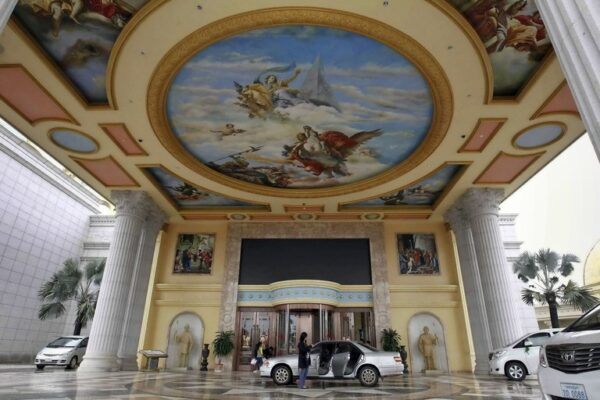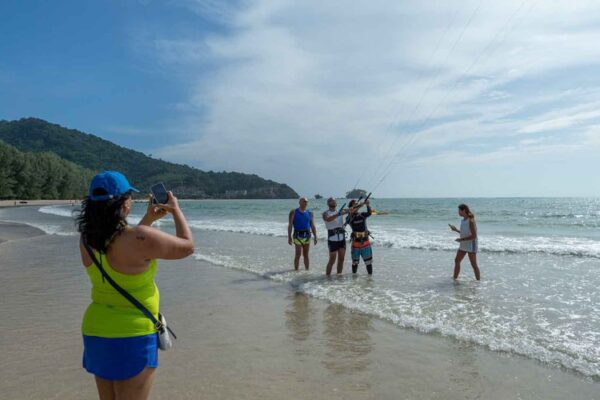>>> Read the more on Bear East Ask any Russian person which country in Southeast Asia they have heard about and you’d probably hear “Thailand.” Russian tourists are crowding its beaches, bars and even its Orthodox churches. That’s not just a sign of Thailand’s legendary reputation for hospitality and knack for catering to foreign visitors that has earned the country the moniker “Land of Smiles.” Thailand welcomed 11.4 million foreign tourists in 2022. But with Russians increasingly limited on where they can visit because of international restrictions imposed on Moscow relating to the war in Ukraine, Thailand has kept its doors open. From Russia with love On the southern island of Phuket, some areas have turned into something resembling a resort town on the Black Sea with Russian men and women lounging on the beach, trying to soak up as much sun as possible. There are signboards in Cyrillic, Russian mothers pushing strollers around and new Russian restaurants that offer a taste of home. Russian real estate agents, tour companies and even Russian tour guides cater to the visitors – which rankles locals in the tourist trade, who say they are losing business. “Russian people love Thailand, the people, the climate, the nature and the delicious food,” gushed Olesya, a young Russian businesswoman. She and her husband, Denis, have been to Phuket five times. Tourists take photos on Patong Beach in Phuket, June 20, 2023. Credit: Tran Viet Duc/RFA Olesya said they felt welcome here and “have not sensed any negative vibes” against Russians – although they were shy of speaking to a journalist and requested to be identified by their first names only. Thailand is America’s oldest ally in Asia, and was for decades a bulwark against Soviet influence in Southeast Asia during the Cold War, but it’s also a nation with a storied past with Russia. Diplomatic relations date back 126 years, when the then-Kingdom of Siam’s modernizing monarch, Chulalongkorn, also known as King Rama V, traveled to St. Petersburg in 1897. Despite the international maelstrom over Russia’s invasion of Ukraine, Thailand has not condemned Moscow and has abstained from several votes against Russia at the United Nations. But perhaps more significantly, there are still ways for Russians to spend their money in Thailand, which relies heavily on tourism earnings. Due to U.S. and U.K. sanctions, Russians can’t conduct transactions via the global SWIFT electronic payment system. But they can still use China’s UnionPay – the world’s largest card payment network – or use cash or cryptocurrencies. Shops catering to Russian tourists have sprung up in Pattaya, Thailand, June 22, 2023. Credit: Tran Viet Duc/RFA Cornering the condo market The Thai Tourism and Sports Ministry said that between January and June this year nearly 800,000 Russian nationals visited the Kingdom, and the number is expected to reach more than 1 million by the end of the year. The Tourism Authority of Thailand has set an ambitious target of receiving 2 million Russian visitors in 2024. Half of them are expected to fly to Phuket. A free 45-day visitor visa and direct flights between the two countries make the goal easier. Maetapong “Oun” Upatising, president of the Phuket Real Estate Association, says that the Russian market bounced back quickly after the COVID downturn, both in tourist numbers and property demands. Russian visitors prefer to rent villas and condominiums instead of hotels when staying longer than three months, and the number of rental units in Phuket alone is more than ten thousand a month, he said. There is also a growing number of rich Russians who obtained long-term resident visas that let them stay in Thailand for five to 10 years or more. Those so-called “elite visas” cost at least U.S.$20,000 yet the number of elite visa holders from Russia is increasing steadily. Between 5,000 and 10,000 wealthy Russians are thought to have obtained long-term visas and become residents in Phuket. Last year Russian buyers purchased nearly 40% of all condominiums sold to foreigners on the island, according to the Thai Real Estate Information Center. Russian investors also put large sums of money into other types of properties, among which luxury villas are the top buy. Those villas come with hefty price tags, starting from 25 million baht ($730,000), according to Maetapong from the Phuket Real Estate Association. Anton Makhrov [left], editor of Novosti Phuketa newspaper, and Jason Beavan, general manager, are seen in their office in Phuket, June 19, 2023. Credit: Tran Viet Duc/RFA Organized crime Phuket even has its own Russian newspaper. Despite the comparative ease with which Russians can travel to Thailand, the paper’s editor gripes that his countrymen get a bad rap. “Right now, it’s legitimate not to like the Russians,” said Anton Makhrov, the editor of Novosti Phuketa, who likens it to a kind of xenophobia against Russians in Thailand. “When you get on Facebook, you’ll see lots of comments such as ‘the Russians are aggressive and arrogant, we don’t like you’ but when you talk to people they all say they have good relations with some Russian friends,” he said, speaking in the weekly paper’s office in a small alley in Kathu district of Phuket. Russian visitors have also often been blamed for bad behavior, as well as petty crime such as drunk-driving and theft. The invasion of Ukraine in 2022 also appears to have dimmed Thais’ perception of Russian people. Katherine Aliakseyeva, principal of the Russian Dance Academy “Katyusha” in Bangkok, says she’s worried about the safety of her staff and students. The school has been regularly taking part in cultural events organized by the Russian Embassy. There are also long-held suspicions that Russian “mafia” operate in Thailand. A December 2009 cable by the U.S. Embassy in Bangkok that was declassified in 2019 said that “Russian organized crime circles established a presence in Thailand in the 1990s after the collapse of the Soviet Union.” According to the diplomatic cable, U.S. and Thai law enforcement agencies reported that “criminal networks composed of mostly…





